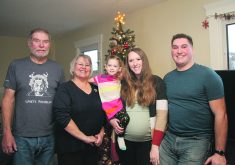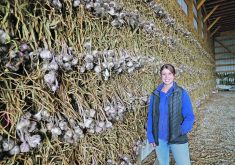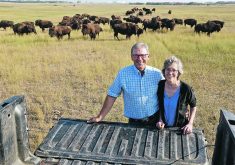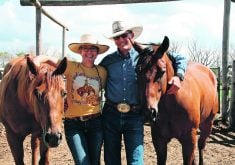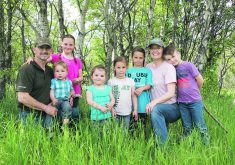GLENLEA, Man. — There are three types of zucchini, five to six types of lettuce, arugula, multiple types of Swiss chard and four types of kale.
As well, there are the regular Red River Valley crops of wheat, oats, canola, soybeans and corn.
And a feeder barn for hogs.
Those are the basic commodities the Bergmann family produces on its farm just south of Winnipeg, and it’s enough to keep most farming families busy.
But Will and Jen, who farm with Will’s father and uncle, have ended up spreading into other off-farm areas as well. It’s something that has happened naturally and be-cause they have been willing to go where things have seemed to be taking them.
Read Also

Nutritious pork packed with vitamins, essential minerals
Recipes for pork
“We are trying to be as much farm-to-table as we can,” Will said one May morning as he seeded rows of vegetables.
Will and Jen have been growing vegetables for a “community-supported agriculture” business for a number of years. During the season they deliver a weekly basket of vegetables to consumers, mostly in Winnipeg, who want to be connected with the people who produce their food.
Soon they also will be partners in a Winnipeg restaurant, to be named Oxbow, which will use their vegetables and — hopefully one day — meat as well.
“It’s kind of the ultimate extension of farm-to-table,” said Will.
“For me, it’s the pinnacle of food production and education and everything all tied together. That’s why we’re in it.”
Will is a sucker for a neat idea and an opportunity, and he can sometimes be talked into doing things that other farmers might shun, such as leaving his farm at seeding time to speak to a conference of foodies in Toronto, which he was planning to do in a couple of days after this interview.
“As farmers, I think we have to interact with urban people if we want them to understand us,” said Will.
He’s also active on social media, something he thinks is important in bridging the urban-rural divide that has resulted in so many city residents having misperceptions about farming.
One urbanite who understood Will and has come to understand farm life is Jen, a Winnipeg girl who never planned to live on a farm.
“I told Will that if he lived any further away from the city I would not have been for it,” said Jen, who met Will when they both were members of the Prairie Voices choir in the early 2000s. Their farm is only 10 minutes from Winnipeg.
They met in 2003, were married within a couple of years and will celebrate their 12th anniversary in July.
“It’s great. It’s better than I expected it to be,” said Jen about living on a farm. “Raising kids on the farm is a dream.”
On top of all the farming, the Bergmanns are also coping with the demands of a five-year-old, a three-year-old and a two-year-old. This doesn’t seem to give them much problem, which makes sense when you realize Jen is an experienced Grade 1 schoolteacher.
Five years ago, they began seriously shooting wedding photographs, and that’s now become an occasional business for them. They have shot 60 weddings with almost all of their gigs local.
“It’s been mostly word of mouth,” said Will.
For Jen, learning the differences between the patterns of rural and city life has been challenging, but she’s figuring it out.
“I’m getting used to it and enjoying it,” said Jen.
“I’ve learned what to expect each year, figured out the schedule, figured out the busy times and the slower times.”
They’ve ended up becoming a couple in which the man is rooted in the country but is getting more connected to the city, and the woman comes from the city but is becoming more of a country person.
It’s a merging of two often alien worlds that both seem happy with.







